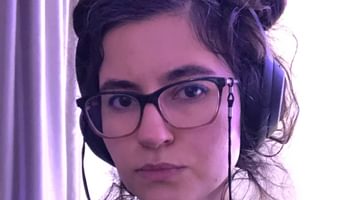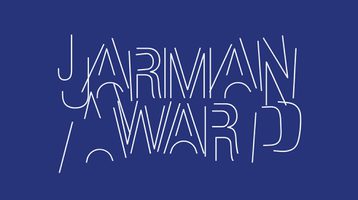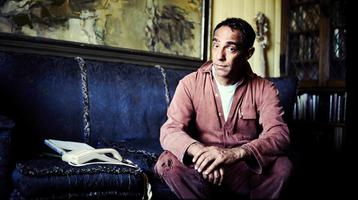unruly desire, unruly frame: On Maryam Tafakory’s نظربازی Nazarbazi
The Film London Jarman Award 2024Nasrin Himada
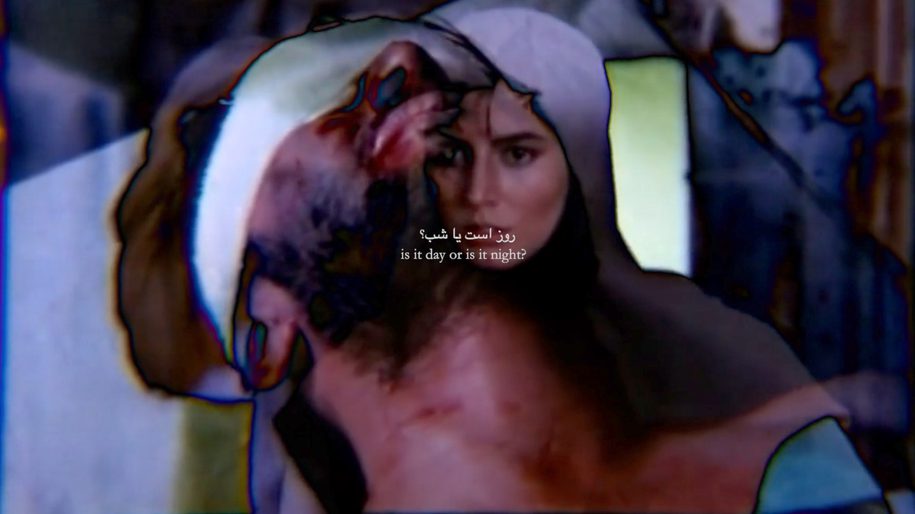
Maryam Tafakory, Nazarbazi (2022), film still. Commissioned by Film and Video Umbrella as part of BEYOND. Courtesy of the artist
‘We were informed from the outset of how this journey would conclude …’
Reading about you, Maryam, you make the cinema of my dreams, I follow your rhythm, the movement of the dance between sound-image,
you are a ‘film-weaver’.1
Your love for the archive teems with possibility –of what appears as new, an image never seen, although it has always existed, in that archive, as someone’s memory, unforgettable yet ephemeral, an affect so familiar yet unknown,
your focus and search, intention, and intuition, produce an intimacy in mid-thought, mid-dream, mid-gesture, like a sentence in formation, a poem about to be written that sounds the call for attention,
and then a cut – next scene, an endless dream, made up of parts.
Doors open then shut, lights turn on then off, a few minutes later, we’re introduced to figures all dressed in white, a snake slithers by, another frame onto blue where water meets sky, someone at a distance running toward the horizon: ‘to enter into oneself and wonder’.
I love your love for montage –
thinking about the possibility of ‘touch without touching‘ is overwhelming and uncomfortable. I know you made this film during the pandemic, but how will it read now, with the many genocides, the many massacres, the unspeakable violence that is taking place?
There is a distance between the ones who are watching and the ones who are suffering – we are not able to touch, reach, or act –
we continue to watch, we continue to listen, we continue to grieve.
Some continued to count the days, but I know others who stopped.
June Jordan wrote, ‘the issue of the Palestinian people is the issue of the value of human life’.2
How do we express this relation between the value of human life and the value of touch? How is the distance between desire and grief put to measure?
I am, dear Maryam, as ‘naked as silence between words’, ‘all my wounds come from love, from loving’.
I think about this when I think about my love for Palestine, and the shared grief exchanged between loved ones, between the ones we want to touch, and hold, and be near to.
Or at least the wish for touch to mend our grief.
This story of grief and desire is the story of my life, writing through the absence in that presence, spaces rendered transgressive without touch but with so much breath, and what is conjured between – is it a love story entwined with loss and endless longing (for our lands), how we hold and feel what is so far away?
We are made both spectator and witness – the reach of arms, hands, fingers –
that space between yields what is unresolved –
‘we screamed’ –
and I wonder how we might imagine a future beyond liberation.3
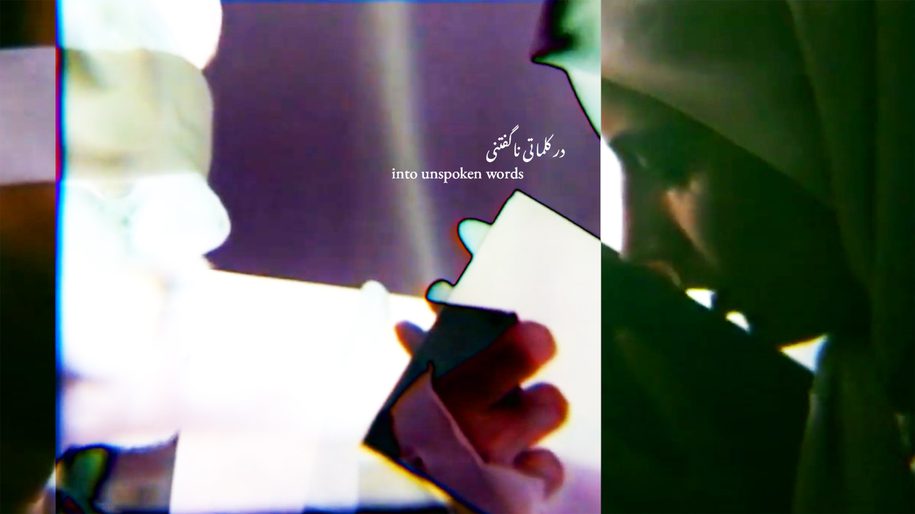
Maryam Tafakory, نظربازی Nazarbazi (2022), film still. Commissioned by Film and Video Umbrella as part of BEYOND. Courtesy of the artist
‘The endless play of ecstasy and injury full of silence’ (we see her under water, from neck up, the sound of her breathing with a bell ringing nearby) –
through the play of glances emerges a play of visions, nazar – what can be storied beyond the frame – through that spiral wall when she looks and turns, then a cut to a spiral staircase –
‘from where this gravity pulls, the indulgence of sin –’
if I were to write you a letter _____, it would go like this:
you and me and Gaza,
me and you and Jenin,
you and me and Hebron,
me in Jerusalem,
and you in Tarshiha,
and I can keep going, but how many more can I name.
That space is a bellow out from inside my gut, the depth of which is unknown, for whatever is between here and my eye is hot with fire, and we are all ready to fight
there’s that word: sumud
now on so many people’s tongues
our words, their gaze.
You and I know how to hold our hearts and run, they’ve captured our words we dreamt from love, but we know now how to use them, better yet, we know how to feel them even better yet, we know how to live them –
we know there’s no distance between us and language. We know there’s no distance between faith and language, between our tongues, and the sounds they write –
there was this bond between us, the care in how we used our words for each other, the words of our lands that we love,
a form of touch so immediate and spatial, expansive and direct, daydreaming our future, we wrote letters only in prose and made promises we knew we couldn’t keep
touch without touching is agony and ache, the kind that lets desire rupture and enflame, imagining the earth in my palm pressed tight against your skin, the salt of the sea on my tongue, it stings my eyes, and I stare at those droplets on your face,
we were sleeping on each other in the sun –
and now, I cannot reach you.
Grief ‘became inaudible, unmentionable, untouchable, impatient silence so overflowing it is –’
I imagine us here by the sea of my country, you speak its language in the morning, then you sent me its poetry.
And then. More distance, more time, more images passed us by so much we could no longer remember our words and why we wrote them.
–
yet we continue to wait, and I still count the days.
1 Elhum Shakerifar, ‘words sketched onto the night’s taught skin’, for Film and Video Umbrella, Online (2021).
2 June Jordan, ‘On Israel and Lebanon: A Response to Adrienne Rich from One Black Woman’ (1982), republished by The New York War Crimes, Online (2024).
3 Katherine McKittrick, ‘Something that exceeds all efforts to definitely pin it down’, in Dear Science and Other Stories (Duke University Press: Durham and London, 2021), pp. 71-74.
Nasrin Himada is a Palestinian writer and curator from Montreal. Their practice is heavily influenced by their long term friendships and by their many on-going collaborations with artists, filmmakers and poets. Nasrin’s recent project, For Many Returns, experiments with writing as an act dictated by love, and typifies their current curatorial interests, which foreground desire as transformation and liberation through many forms.
